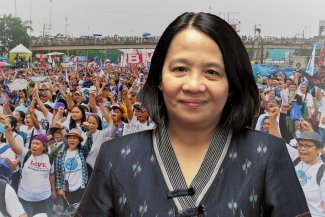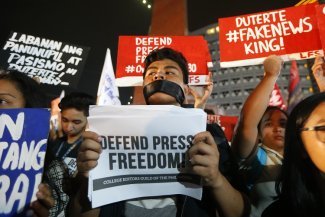
Following the passage of an anti-terrorism bill, human rights protesters in Quezon City, Philippines, call on the Duterte government to “stop the killings” in June 2020.
It was a stroke of luck that Mary Ann Castillo had the day off last March when several soldiers and police officers came to pay her a visit at the electronic components factory where she works in Laguna, near the capital city of Manila. They even went to her home afterwards but found no one there either. The visit was, however, enough to scare her – she had become a target of the authorities because of her work as a trade union representative.
Trade unions in the Philippines have found themselves in a precarious position ever since the 2016 election of Rodrigo Duterte, who won over the masses with a promise to protect the country’s most disadvantaged citizens, including its most vulnerable workers. He also promised to end the epidemic of drug abuse that had swept the country.
Duterte’s ‘war on drugs’ has resulted in a campaign of extrajudicial executions that has cost at least 6,235 lives, according to official Philippine government figures. Human rights organisations, however, put the number of killings at more than 12,000. They claim that the campaign has been used to target political opponents and activists. “It’s clear that the war on drugs has trampled on basic respect for human rights and the rule of law, which has in turn made it dangerous for any worker or union leader trying to take on a powerful company by organising a union,” says Phil Robertson, deputy director of Human Rights Watch’s (HRW) Asia division.
According to Eleanor ‘Lengua’ de Guzman, human rights director of the Kilusang Mayo Uno (KMU) union, trade unions were one of the primary targets of the 2019 crackdown: “There had been arrests of comrades before, but shortly before the pandemic they started attacking us, persecuting us, harassing us.”
Things took another turn for the worse when a new anti-terrorism law was passed in 2020, granting the government unlimited powers in the search and capture of people suspected of terrorism.
One of the government’s tactics has been the use of ‘red-tagging’, the practice of blacklisting individuals and organisations suspected of having links to communist groups. “Union leaders who criticise Duterte face accusations and reprisals from the government. In the worst cases, they are red-tagged as communists or sympathisers. These labels put their lives directly at risk,” says Robertson.
And the risk is real. According to KMU data, 56 trade unionists have been victims of extrajudicial killings under the Duterte administration. One of the bloodiest days was 7 March 2021, when nine union members and other activists were killed. The Philippine Department of Employment itself recently announced an investigation into 60 cases of alleged or attempted extrajudicial killings that have taken place during Duterte’s presidency. “Trade unions are active agents of change. They are trying to stop us from organising,” says de Guzman. Arbitrary arrests are also common. Esteban ‘Steve’ Mendoza, vice-president of Pamantik, a regional KMU organisation, was one of several people arrested on ‘Bloody Sunday’ and currently remains in prison.
Mary Ann Castillo, president of the Workers’ Union at Nexperia, a leading global semiconductor company, has begun to change her commute route as a precaution. A few weeks ago, she left for Manila for a month with the vice-president of her organisation who, Castillo says, has suffered a campaign of harassment worse than she has. “He’s had more than a dozen visits to his house,” she says. “It’s very difficult to be a union representative right now,” says Castillo, whose organisation is affiliated to the KMU. “The truth is that we are afraid. It’s psychological torture.”
No improvements in labour conditions
Castillo began her journey as a labour representative after a dispute at her company in 2014. “We were asking for a wage increase and in response they fired 24 workers, including me.” Castillo succeeded in getting herself and 12 other colleagues reinstated. The incident led her to run for the union’s presidency.
Castillo believes that if the same thing were to happen today, they would not be able to defend their rights in the same way. The Philippine government has not only used the campaign against drugs and terrorism but also the pandemic to further limit the ability of unions to protest for better working conditions. “It has definitely been more difficult to advocate for our rights over this period,” says Castillo. “Now, in addition to being concerned with our workers’ rights, we are also concerned with our own safety.”
Yet in a country with high numbers of working poor, improvements to labour conditions can’t afford to wait. According to data from the Asian Development Bank, while the unemployment rate in the Philippines is only 2.5 per cent, 23.7 per cent of the population lives below the national poverty line. “For a populist who claims to be in favour of the poor and determined to help ordinary people, Duterte has been a disaster for workers’ rights in the Philippines,” says Robertson of HRW.
In a review of the Philippines labour market, the World Bank writes: “Poverty is primarily due to low earning capacity of the poor and to their limited access to regular and productive jobs. Behind these are the two interrelated root causes of in-work poverty – low education of the poor and the scarcity of productive job opportunities.
The minimum wage in the Manila region is 533 pesos a day (€9.50, US$10.20) for workers in the agricultural sector, and 570 pesos (€10.10, US$10.90) for all other sectors. And while the minimum wage was recently adjusted in an effort to compensate for the rampant inflation that has hit the Philippines along with much of the world, it falls far short of what is needed to provide for a family. “A family needs about 1,070 pesos (€19, US$20.40) in order to live with dignity. That’s almost twice as much,” de Guzman explains.
De Guzman’s main frustration has been the lack of necessary changes in the law to tackle the country’s high level of temporary and informal employment. “It was one of Duterte’s electoral promises, but it has been watered down,” she says.
In 2018, Duterte signed a decree banning the use of temporary contracts but removed from it a phrase that trade unions considered key – that permanent employment should be the norm in employer-employee relations.
Despite their frustration and fear, neither Castillo nor de Guzman plan to withdraw from the trade union struggle. “As union members, we’ve chosen not to be afraid. We have to keep fighting. If we don’t, we’ll lose our most fundamental rights,” says de Guzman. And although Duterte’s term ends on 30 June, his successor, the son of former dictator Ferdinand Marcos, is likely to enact similar policies.
During his presidential campaign, Bongbong Marcos defended his father’s legacy, calling him a “political genius” despite his long record of human rights abuses, including the widespread arbitrary arrests, torture, forced disappearances and extrajudicial killings documented over the course of his more than two decades of rule. Marcos himself, who was deposed by a popular uprising in 1986, told Amnesty International that over 50,000 people had been arrested between 1972 and 1975.
Like Duterte and Ferdinand Marcos before him, Bongbong Marcos won the presidency on populist promises, such as lowering the price of rice. But human rights advocates no longer trust the word of political leaders like Marcos. As Castillo explains: “We already know his family’s past and his political ideas. That’s why we have to continue fighting.”












